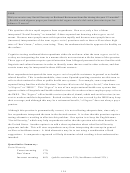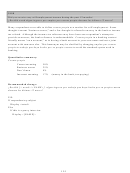Survey Methodology #2003-17 - The American Community Survey (Acs) En Espanol: Using Cognitive Interviews To Test The Functional Equivalency Of Questionnaire Translations - U.s. Bureau Of The Census Page 29
ADVERTISEMENT
R2
The following questions are to make sure this list is as complete as possible. Does anyone else
live or stay here, such as roomers, foster children, boarders, or live-in employees?
Las siguientes preguntas son para asegurar que esta lista este lo mas completa posible… ¿Vive
o se esta quedando alguien más aquí, tal como, compañeros de cuarto, hijos de crianza, pupilos,
o empleados que viven en el hogar?
As described in MOREPER above, R2 served to clarify the intent of MOREPER. By not
mentioning spouses or children, this question helped respondents realize that they should have
included family members in their response to MOREPER.
Key terms in this question, however, were not understood as intended. Only a few respondents
interpreted compañeros de cuarto as a conceptual equivalent to roommates. Most thought this
concept referred to people who share a bed; people who they sleep with; or sexual partners.
Most respondents did not interpret the term hijos de crianza as intended. The English term refers
to foster children, but a majority of respondents thought this term referred to biological or
adopted children. This may be due to two factors. First, the term crianza derives from criar,
which means “to raise,” as in “to raise a child.” Although this is partly related to the concept of
foster child, respondents specifically applied this term to children they cared for regardless of
whether the children were biological, formally adopted, informally absorbed into the household,
etc. Second, the concept of foster care involves legal arrangements through which adults are
paid to raise children in their homes. There is no word or equivalent marker in Spanish for the
“foster” concept. Most respondents are not familiar with this concept of having the government
pay someone to raise children, and babysitting is the closest concept to which they were able to
relate. The few respondents who were familiar with the term, borrowed the English marker
“foster,” so keeping the English word instead of trying to find a Spanish marker is
recommended.
An overwhelming majority did not know the meaning of pupilos. The dictionary translation of
pupilo includes student and apprentice. Although only a couple of respondents knew the
dictionary meaning, the word pupilo raises another issue. The English version of this question
does not mention students or apprentices, so although this question is grammatically correct, the
Spanish question is asking something different from what the English question is asking.
Quantitative summary:
Compañeros de cuarto
Correct meaning
33%
Don’t know
8%
Incorrect meaning
58%
Modes: friends; people you sleep with
Hijos de crianza
Correct meaning
25%
Don’t know
0%
Incorrect meaning
75%
Modes: biological children; adopted children
I - 2
ADVERTISEMENT
0 votes
Related Articles
Related forms
Related Categories
Parent category: Legal
 1
1 2
2 3
3 4
4 5
5 6
6 7
7 8
8 9
9 10
10 11
11 12
12 13
13 14
14 15
15 16
16 17
17 18
18 19
19 20
20 21
21 22
22 23
23 24
24 25
25 26
26 27
27 28
28 29
29 30
30 31
31 32
32 33
33 34
34 35
35 36
36 37
37 38
38 39
39 40
40 41
41 42
42 43
43 44
44 45
45 46
46 47
47 48
48 49
49 50
50 51
51 52
52








